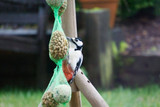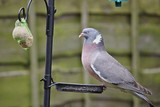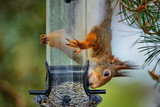10 bird feeding mistakes and how to avoid them
Here are 10 of the most common bird feeding mistakes so you can avoid them and create a healthy bird feeding routine.
You’d be forgiven for thinking that wild birds will accept just about any food you give them. When they’re swooping down for their treats it’s almost as if they’ve never eaten before. However, there are lots of things that you can get wrong when feeding wild birds. You not only need the right types of bird food, but the way in which you feed them is important too.



Letting your feeders run empty
You won’t attract that many wild birds if your feeders are often empty. If it’s consistently empty, you don’t stand much of a chance at all, unfortunately. Just keep them stocked up and you’ll soon have them flocking to your garden. With a reliable source of bird food, wild birds in the area will continue to visit. Make sure the feeder is clean and in good shape, too!Using cheap bird seeds
Buying cheap bird seed is one of the most common bird feeding mistakes. We understand that you want to save money, of course. However, cheap birdseed is often packed full harsh fillers like cracked corn, oats, and wheat. There aren’t many wild birds out there that will find these tasty! Rather the contrary, they’ll probably discard them and you’ll get lots of unsightly weeds sprouting. There are still affordable options out there, all you have to do is shop around. Our fat balls are a bird favourite!Ignoring natural bird food sources
One of the most important things to remember with bird food is that it should be as close as possible to their natural sources. Like we said with the cheaper bird seed, if it’s full of additives and artificial sources then the birds will be deprived of the most nutritious and economical food available to them.Not protecting bird feeders
There are many other creatures in the wild that will find bird food just as tasty (everything from squirrels to rats). These little critters can deplete your feeders quicker than the birds themselves, so you’ll want to keep an eye on your feeders.Not cleaning your bird feeders
We mentioned this earlier but it deserves its own section. Dirty feeders often become clogged, while wet or spoiled seeds can spread diseases which then spread to entire flocks. What’s more, unkempt bird feeders are often more susceptible to wear and tear and you may need to repair them more.
Not storing seeds properly
While bird seeds have a decent shelf life, this is only if they’re stored in the correct way. If seeds aren’t stored well, they can be invaded by silverfish, earwigs, mice, moths, and more. You don’t want any of these creatures in your birdseed! The seeds will get old and eventually dry out, by which time they’ll be completely put off by the food once it’s out. What’s more, if water can get into the seeds then mould will grow - this will definitely put birds off!Neglecting to feed winter birds
Lots of people actually think that you don’t have to feed birds in winter, but it’s in winter that birds need sustenance more than ever. Feeding wild birds in winter gives them a vital leg-up in a season where they must survive.Feeding birds bread
Bread does not provide adult birds or hatchlings with the nutrition that they need. Processed bread products are actually one of the worst things that you can give to birds. Small amounts won’t hurt them, but it’s so starchy and full of additives that you’ll want to avoid feeding them bread altogether.Using just one kind of bird feeder
Wild birds will all have their own preferences as to how they eat their food. For example, bluebirds will want mealworm dishes while woodpeckers prefer suet feeders. A variety of options means that you could get a variety of wild birds visiting your garden. More the merrier we say!Putting too much food out at any one time
You should put out small amounts of bird food at a time. Wild birds prefer their food fresh and dry, and if food has gone bad then they’ll almost definitely turn their beaks up at it. Remember - little and often!What not to feed wild birds
Here is a brief rundown of some of the foods that you should not feed wild birds.- Milk
- Chocolate
- Fruit pits
- Avocado
Healthy bird feeding with KWBF
There you have it! Now you know what not to do, and which bird feeding mistakes to avoid, just watch the birds flock to your garden! Remember to use our Bird Spotter map to document any birds you find. In the meantime, stay tuned to our blog for more wild bird news!28th Aug 2019
Explore Popular Articles
-
8 Easy Ways to Attract Woodpeckers to Your Garden
8th Apr 2024Woodpeckers are among the most interesting birds known for their drumming sound and bright colours.
-
How to Protect Your Bird Feeders from Pigeons ?
28th Mar 2024You must have noticed damaged feeding ports, hanging mechanisms, perches, lids and bottoms. Who coul
-
5 Foolproof Ways to Rat-Proof Your Bird Feeder
18th Mar 2024Building a bird-friendly environment is a delightful endeavour, but it involves the responsibility o




